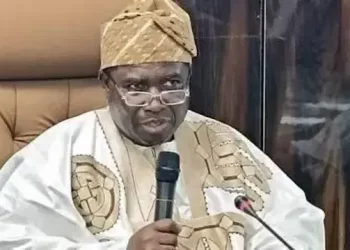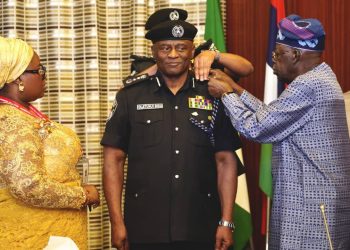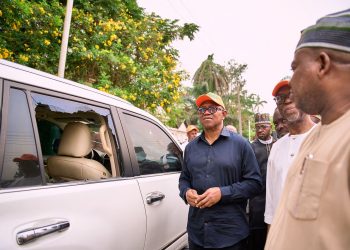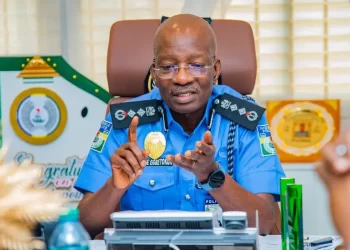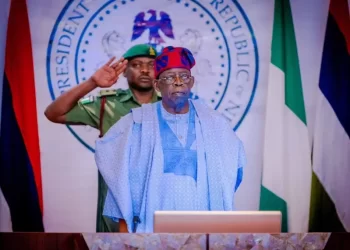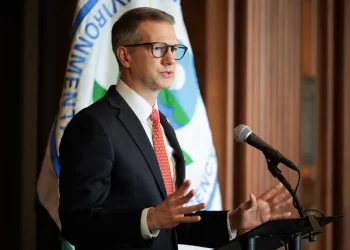Speaker of the House of Representatives, Yakubu Dogara yesterday, identified the National Assembly as the ‘stabilising force’ that saw to the end of the third term ambition of former president Olusegun Obasanjo, saying, that singular act saved Nigeria’s democracy.
Dogara, who took time to enumerate the contributions of the legislative arm of government to the sustenance of democracy since 1999, said even with the outstanding display of bi-partisanship which ensured increased funding for the Niger- Delta Development Commission (NDDC), the passage of the Pension Reform Act, the enactment of the 2002, 2006, 2010 Electoral Acts which led to the recently commended effectiveness of the Independent National Electoral Commission (INEC), the outright rejection of tenure elongation remained the legislature’s finest hour.
Dogara spoke at the inaugural edition of National Political Summit organised by the Save Democracy Group headed by former Speaker, Alhaji Ghali Umar Na’abba.
The summit had as its theme, “2015 General Elections: Consolidating the Gains and Building Positive Political Culture for Sustainable Democracy in Nigeria.”
He said: “Perhaps one of the greatest achievements of the Legislature in Nigeria and its biggest contribution to democratic consolidation in Nigeria is the rejection of the third term bid of the former president Olusegun Obasanjo.
“Both chambers of the National Assembly, in a historic vote rejected the proposed amendment of the Constitution to extend presidential tenure from 8 to 12 years. Perhaps that singular decision ensured that our democracy survived.”
The Speaker, who delivered the keynote address at the summit entitled “The Legislature and the Stability of Nigerian Democracy,” stressed that despite being the least understood arm of government due to the long stay of the military in power, the legislature rather than promoting or glossing over graft has fought corruption.
In a related development, an Ad-hoc committee investigating the $470 million contract for the provision of Closed Circuit Television (CCTV) in the Federal Capital Territory (FCT) and Lagos State awarded during the administration of former president Goodluck Jonathan yesterday said its investigation is strictly concerned with discovering why the contract failed and not a plot to ridicule anyone. The committee said the probe shouldn’t be viewed as All Progressives Congress (APC) versus the Peoples Democratic Party (PDP) matter, as the issue of a company receiving the naira equivalent of “over a trillion naira” and not delivering should be seen as an issue of national importance.
Last Thursday, the committee headed by Ahmed Yerima (APC Bauchi) summoned the Finance Minister, Kemi Adeosun, the National Security Adviser (NSA), Gen Babagana Monguno (retd) and Governor of Central Bank of Nigeria (CBN), Godwin Emefiele over the contract probe.
The committee also invited Inspector-General of Police, Solomon Arase, Lagos State governor, Akinwunmi Ambode, FCT minister Mohammed Musa Bello, Minister of Interior, Gen Abdulrahman Dambazau (retd), Minister of Communications, Adebayo Shittu and Executive Vice Chairman of the Nigeria Communications Commission (NCC), Garba Dambatta.
A public hearing on the project will commence on Tuesday (today).
In a statement it issued yesterday ahead of today’s hearing, the committee recalled how the 7th House conducted a similar probe, but that certain “forces” did not allow the report to be made public.
Reportedly, a Chinese firm, ZTE, handled the projects and later stalled the process after collecting $100million of the total contract value.
The committee explained that $100million was around 20 per cent of this year’s N6.07trillion national budget.
The committee added that the non-completion of the projects also hampered the capacity of security agencies to gather intelligence on the activities of criminal elements in the country.
The statement read in part: “It is apparent that public trust has been abused and many lives have been lost as a result.
“In line with the Federal Government’s zero tolerance to corruption and effort to streamline its activities for better efficiency, this committee will do its best to investigate the circumstances surrounding this contract.”
“The war on corruption has been waged legislatively by the National Assembly by the enactment of both the Economic and Financial Crimes Commission (EFCC) and Independent Corrupt Practices Commission (ICPC) Acts, enactment and amendments of the Money Laundering Prohibition Act.
“The legislature has been consistent in the use of the oversight mechanism of the National Assembly to expose corruption, inefficiency and waste in the administration of laws passed by the National Assembly.” The Sun


